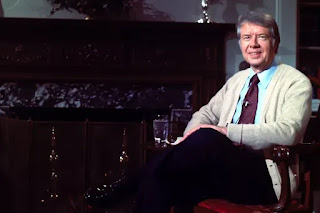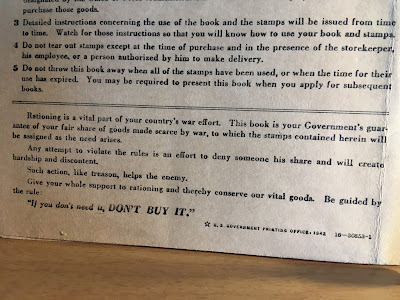Thoughts on thrift and 14 ways I lessen my impact on the earth
When I was a little girl, I sometimes made cookies with my mother. I can still hear her say, “Your grandmother could make a dozen cookies with the batter left in that bowl” when I put what I thought was an empty bowl into the sink. I don’t know if my mother was able to get 12 cookies out of what remained, but the lesson made an impact on me and was one of many messages on thrift that I heard throughout my childhood.
 My parents instilled in me the importance of taking only what you need and not wasting things. These beliefs were passed on to them from their parents who lived through the Great Depression and reinforced to them as children during World War II. I remember waiting in gas lines in the 1970s, and Jimmy Carter’s plea to turn the thermostat down and put a sweater on* was taken seriously by my family. In addition, my hometown, Randolph, New Jersey, started mandatory curbside recycling in the early 1980s and my parents were avid proponents from the start. With these messages during my formative years, it was easy to begin modifying my behavior when the evidence became overwhelming that human activities and consumption were having a major impact on climate change.
My parents instilled in me the importance of taking only what you need and not wasting things. These beliefs were passed on to them from their parents who lived through the Great Depression and reinforced to them as children during World War II. I remember waiting in gas lines in the 1970s, and Jimmy Carter’s plea to turn the thermostat down and put a sweater on* was taken seriously by my family. In addition, my hometown, Randolph, New Jersey, started mandatory curbside recycling in the early 1980s and my parents were avid proponents from the start. With these messages during my formative years, it was easy to begin modifying my behavior when the evidence became overwhelming that human activities and consumption were having a major impact on climate change. Lately, I have been thinking about what I have been doing to lessen my impact on the planet. Here is my list. Feel free to share your thoughts and suggestions in the comments section of this post.
1. Reduce consumption, reuse items, recycle – in that order.
2. Think about food choices – eat meat sparingly, buy local food when possible (sometimes hard to do in Montana), avoid food with excess packaging, avoid foods from exotic places.
3. Bring reusable bags to the grocery store, a reusable mug to the coffee shop, and keep a bamboo utensil set in my purse. Bring a container when I eat out in case there are leftovers.
4. Compost food scraps.
5. Grow food appropriate for my area and plant a garden only as big as I have time to manage well.
6. Bike or take the bus to work every day. Walk or bike for errands when possible.
7. Fly only a few times a year.
8. Drive an older car (2009 Honda CR-V) that gets decent mileage for its size.
9. I plan to have my car as long as possible (My 15-year-old vehicle has only 91,000 miles on it.) and plan to buy an alternative fuel vehicle when it’s time for a new car.
10. I don’t let my car idle. (I wrote about going idle-free here.)
11. Live in a modest house by today’s standards, 1,675 square feet for the two of us.
12. I have a plan to make energy efficient upgrades to my home as my budget allows.
13. Keep the heat in my house at 65 degrees during the day and 55 degrees at night and use extra blankets or a sweater if needed. Our house does not have air conditioning.
14. Stay informed about climate issues and make decisions accordingly.
Sometimes I find myself frustrated and agitated when I obsess over my purchasing choices (as I wrote about here). These 14 things can be a lot of work but at the same time it doesn’t feel as if I’m doing enough. I sometimes think if I were to do more, would it really make a difference? After all, it’s the actions of many that will make a difference. Sadly, I think the United States has a long way to go before we see widespread changes in consumption patterns.
When I was cleaning out my parent’s house after they passed away, I found my mother’s war ration booklet from 1943 and was struck by the government's messaging that promoted a communal sense that we are in it together and one’s activities have an impact on others and the country. And they were serious about it. “Any attempt to violate the rules is an effort to deny someone his share and will create hardship and discontent.” Violators were subject to a $10,000 fine, imprisonment, or both.The government encouraged everyone to live by the rule “If you don’t need it, don’t buy it.”
While I don’t wish for war, could anything less dramatic cause masses of Americans to re-think their consumption habits? In many ways, the United States has become a society that that is extremely self-centered and focused on personal freedoms. We have become a nation that is dead set against having anyone tell us what we can or cannot do.
People freak out when there is talk of charging for or banning plastic bags in grocery stores. One’s daily cup of coffee comes in a paper cup with a cardboard sleeve and plastic lid. We live in huge houses and drive huge cars. Rather than spend a few minutes in a cold vehicle, we let them idle before getting into them. Instead of an extra blanket or putting a sweater on, we crank up the heat.
As Mike once famously said, “We've lost our collective edge. Thrift and toughness are on the wane. Posturing and laziness, however, are easily found.”
Can the average American make sacrifices for the greater good? I’m not sure we can.
I’m a strong believer that climate change is real. The scientific evidence it too compelling to believe otherwise. But if it were ever shown that the scientists had it wrong, I would have no regrets and show no resentment. I would not lament the bigger car I could have driven or the fact that I could have gone to the grocery store with little concern over what went into my cart. I would not bemoan the effort it took to recycle, compost, remember my reusable bags and coffee mug. I would not regret my decisions one bit.
What matters is that we keep being mindful of our consumption and our impact on the planet and we encourage others to do the same. Going light on the planet is the right thing to do.
*"There is no way we can solve it (the energy crisis) quickly. But if we all cooperate and make modest sacrifices, if we learn to live thriftily and remember the importance of helping our neighbors, then we can find ways to adjust, and to make our society more efficient and our own lives more enjoyable and productive....There is no way that I, or anyone else in the Government, can solve our energy problems if you are not willing to help. I know that we can meet this energy challenge if the burden is borne fairly among all our people—and if we realize that in order to solve our energy problems we need not sacrifice the quality of our lives." Jimmy Carter, February 2, 1977, report to the nation on energy
Find the full audio recording and transcript is here.
A short video excerpt is here.
~
More from the blog:
The original rant - https://annvinciguerra.blogspot.com/2020/06/the-rant.html
You are not what you drive -http://annvinciguerra.blogspot.com/2014/10/you-are-not-what-you-drive.html



My parents and grand parents survived the Great Depression of the '30s. Scarred me for life with the "thrift" ethic.
ReplyDelete